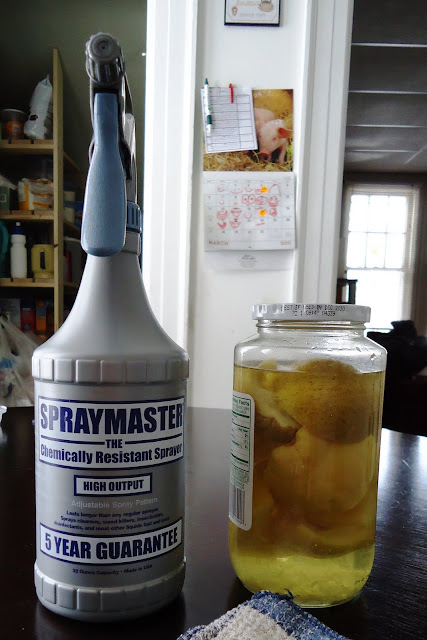Do you know what is in that bottle of all-purpose cleaner you bought at the grocery store? Alcohol ethoxylate? Benzalkonium chloride? What is that?
Our family has been using homemade cleaners for a couple years now. They are cheaper, smell better, and best of all are non-toxic. The base ingredient in most of our homemade cleaners is the wonderful substance we all know as vinegar. Either white or apple-cider vinegar can be used, but keep in mind that apple-cider vinegar could stain light colored fabrics and carpets.
This particular recipe is my favorite. It smells nice, and is versatile. We use it on counters, tables, walls, floors, carpets, and fabrics. So, the next time you make lemonade or juice some limes for a meat marinade, don't compost those peels just yet!
Enough Vinegar to Cover
A Large Jar or Crock
A Heavy-duty Spray Bottle
Process:
1. Jar it up.
I took my lemon and lime peels, put them in a large jar, and poured in enough vinegar to completely cover the peels. Then, I screwed on the lid and shook well. Our pantry is a cool, dark place, so I chose to store my jar of peels and vinegar there while it infused.
2. Shake it.
Over the next two weeks, I shook the jar of peels every few days. I felt this would give my cleaner a stronger lemon-lime scent.
3. Strain and use.
Once two weeks had passed, I took the peels out of the jar with a fork. I then poured the vinegar through a mesh strainer to remove the remaining smaller pieces of pulp. Next, I put a funnel into my spray bottle, and poured the vinegar in. I now had a nice, fresh smelling cleaner! You can dilute the cleaner with water if you'd like.
You can also add a few extra ingredients if you'd like to make this a more heavy-duty cleaner, as in the recipe that follows:
2 cups Lemon-Lime Vinegar All Purpose Cleaner
1 teaspoon borax
1/2 teaspoon baking soda
1/2 teaspoon washing soda
1 teaspoon mild liquid soap
5-10 drops tea tree essential oil, or other essential oil of your choice (optional)
Combine all ingredients in a large container. I say large because the sodas will fizz when combined with the vinegar, and you will need extra room so it doesn't spill over. Pour mixture into a a spray bottle and clean your house.
Our family has been using homemade cleaners for a couple years now. They are cheaper, smell better, and best of all are non-toxic. The base ingredient in most of our homemade cleaners is the wonderful substance we all know as vinegar. Either white or apple-cider vinegar can be used, but keep in mind that apple-cider vinegar could stain light colored fabrics and carpets.
This particular recipe is my favorite. It smells nice, and is versatile. We use it on counters, tables, walls, floors, carpets, and fabrics. So, the next time you make lemonade or juice some limes for a meat marinade, don't compost those peels just yet!
Lemon-Lime Vinegar All-Purpose Cleaner
Ingredients: Lemon and/or Lime PeelsEnough Vinegar to Cover
A Large Jar or Crock
A Heavy-duty Spray Bottle
Process:
1. Jar it up.
I took my lemon and lime peels, put them in a large jar, and poured in enough vinegar to completely cover the peels. Then, I screwed on the lid and shook well. Our pantry is a cool, dark place, so I chose to store my jar of peels and vinegar there while it infused.
2. Shake it.
Over the next two weeks, I shook the jar of peels every few days. I felt this would give my cleaner a stronger lemon-lime scent.
3. Strain and use.
Once two weeks had passed, I took the peels out of the jar with a fork. I then poured the vinegar through a mesh strainer to remove the remaining smaller pieces of pulp. Next, I put a funnel into my spray bottle, and poured the vinegar in. I now had a nice, fresh smelling cleaner! You can dilute the cleaner with water if you'd like.
You can also add a few extra ingredients if you'd like to make this a more heavy-duty cleaner, as in the recipe that follows:
Heavy-Duty All-Purpose Cleaner
Ingredients:2 cups Lemon-Lime Vinegar All Purpose Cleaner
1 teaspoon borax
1/2 teaspoon baking soda
1/2 teaspoon washing soda
1 teaspoon mild liquid soap
5-10 drops tea tree essential oil, or other essential oil of your choice (optional)
Combine all ingredients in a large container. I say large because the sodas will fizz when combined with the vinegar, and you will need extra room so it doesn't spill over. Pour mixture into a a spray bottle and clean your house.

Neat! I use vinegar, water and a wee bit of lavender oil and a smidgen of soap. I bet this turns out smelling nice :)
ReplyDeleteI'm making this and I pinned it.
ReplyDeleteIt is 'fusing' and tomorrow is 'times up' ...so I can't wait to try it!
Pat
Hi Pat, thanx for the pin; hope you enjoy your cleaner!
Delete